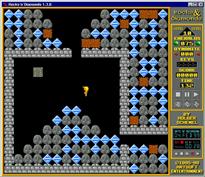
Currently, the best source for this accumulated knowledge seems to be ProtonDB where you can search for any game of interest and see what people have reported (combined with details about their hardware, graphics drivers, etc.).
#Armagetron advanced steam how to#
Many Linux gamers eagerly tested this new feature and started compiling their own unofficial lists of compatible and semi-compatible games as well as advice for how to get certain games to perform more effectively. You can also enable installation of unconfirmed games, many of which run wonderfully (though some will require a little tweaking).
#Armagetron advanced steam install#
With this tool enabled, the Linux version of Steam can now directly install a growing list of Windows games that are officially confirmed as Proton-compatible. However, in my experience it usually works beautifully, including installation of the Windows version of Steam followed by installation of multiple Steam games within that same PlayOnLinux setup.Īctually, that last example involving Steam is, I'm happy to say, now superfluous: on August 21, 2018, Valve-the company behind Steam and a strong supporter of Linux gaming-announced the release of their own Wine-based compatibility tool: Proton. Now, I must admit, installing a Windows game this way doesn't always go smoothly, and even if everything runs perfectly at first, if the game continues receiving updates there's a small chance it could eventually break your Wine setup. I recommend installing Lutris and/or PlayOnLinux as their communities have created install scripts to help set up Wine configurations for a wide array of games and other software. Now, what about those Windows-only games? Well, for starters, many Windows programs actually run extremely well on Linux with just a little help from a "compatibility layer" such as Wine. Oh, and for all you Minecraft addicts out there, there's a Linux installer available as well as a free and open source clone called Minetest.



You can follow these links to browse extensive lists of Linux games available through a few popular portals: Steam, GOG.com, and the indie-focused itch.io. Windows is still the primary market, so not everyone ports to other systems, but that's starting to seem like the exception rather than the rule. This is also true of more general applications, such as Discord and Spotify. More than ever before, developers are creating native Linux (and macOS) builds of their PC games. Let's get right to the big question: What can Linux offer hardcore gamers?


 0 kommentar(er)
0 kommentar(er)
